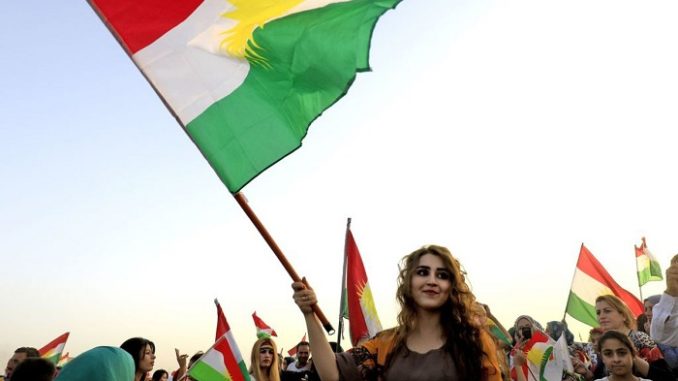
An independence referendum was held on September 25th in Iraqi Kurdistan in which 93 percent of voters supported independence. The recent vote points toward the long struggle for Kurdish independence.
There is always a feeling of déjà vu when considering efforts for an independent Kurdistan. In 1880-1881, there was a revolt led by Shaikh Ubaidullah al-Nahir who claimed that the Kurds were a nation separate from the Ottoman and Persian empires in which they found themselves. From 1908 until the start of the First World War, there was Kurdish cultural and political agitation. The term Kurdistan started to be used widely during this period.
The breakup of the Ottoman Empire at the end of the First World War was a defining moment for many Kurds who thought that they had been promised a separate state. In practice, they were shut out of the post-war structures – an agreement between the English and the French, the key “outside” powers at the time.
During the Second World War, Iran was occupied by English and Soviet troops. In part of the area under Soviet control, a Kurdish-led Republic of Mahabad was created, only to be destroyed when the Soviets withdrew in 1946-1947, considering it too early to confront the Western military strength which desired a unified Iran.
More recent Kurdish history in Turkey with Abdullah Ocalan and the Kurdistan Workers Party (PKK) has been violent and complicated. Repression and fear of any form of Kurdish political and cultural activity remains the order of the day for the Turkish government. This is increasingly so due to the growth of authoritarian political leadership in Turkey.
The situation of the Kurds in Iraq under Saddam Hussein was as violent and complicated as in Turkey. However, two Gulf Wars and U.S. intervention led to the creation of an autonomous Kurdish area under President Masoud Barzani. (1)
The civil war conditions in Syria have also led to efforts to create Kurdish autonomy, if not a separate start, called Rojava. (2)
The September 25, 2017 vote in the Kurdish Autonomous Region of Iraq is considered a prelude to negotiations with the Iraqi government and not as a “Declaration of Independence.” The vote was carried out despite warnings from the Iraqi Prime Minister Haider al-Abadi that it was unconstitutional. Additional warnings came from Turkey’s President Recep Tayyip Erdogan that if the vote were held he would shut the oil pipeline going to Turkey which provides the bulk of the Iraqi Kurdish zone’s revenues. Iran agreed with the USA that “now is certainly not the moment given the armed conflict in Syria and Iraq.”
Turkey, Iran and Syria all fear that moves for an independent Kurdish state in Iraq will lead to demands within their state for greater Kurdish autonomy, or demands for a unified Kurdistan. Washington certainly does not want to deal with such demands especially at a time when Iraqi Kurdish fighters, the Peshmerga, are useful allies in the battles against the Islamic State (ISIS).
Creative thinking on confederal forms of government are in short supply in the current fog of war and repression in the wider Middle East. There should be ways in which there could be autonomy for the majority Kurdish areas while protecting the rights of the ethnic/national minorities which also live in the Kurdish areas. There have always been other ethnic or religious groups living in areas which Kurdish leaders consider as Kurdistan. More recently, Saddam Hussein had carried out an “Arabization policy” by moving Arabs into Kurdish-majority areas.
There should also be ways of cooperation and active interaction among Kurds living in Iraq, Syria, Iran and Armenia. There are also Kurds living in Lebanon, and a good number of Turkish Kurds have moved to Germany and other western European countries. Cooperation within the wider Kurdish community could have a positive political impact on the region.
An unlikely source of creative political thinking among some of the Kurdish leadership comes from a US radical writer and teacher, Murray Bookchin (1921-2006). (3) Bookchin, who in the 1940s-1950s was active in trade union organizing and Trotskyite factions, later developed what he termed “Social Ecology” with an emphasis on bottom-up development largely based on villages, towns, and cities as the core units for decision-making. He called this “confederal participatory democracy.”
Bookchin’s ideas have been taken up by the Turkish Kurd leader Abdullah Ocalan on his prison island and by some of the leadership in the Syrian Kurdish movement. Bookchin’s approach may be of use in finding ways of developing autonomy, participation in decision-making, and trans-frontier cooperation without creating new “Nation-States.” There are times when such creative thinking can be carried out in the midst of armed conflict, as was the case of some resistance movements in Europe during the Second World War.
Rene Wadlow is the President of the Association of World Citizens.
Notes
1) See Keri Yildiz. The Kurds in Iraq: The Past, Present, and Future (London: Pluto Press, 2004)
2) See Michael Gunter. Our of Nowhere. The Kurds of Syria in Peace and War (London: Hurst and Co. 2014)
3) See Janet Biehl. Ecology or Catastrophe. The Life of Murry Bookchin (Oxford: Oxford University Press, 2015)
